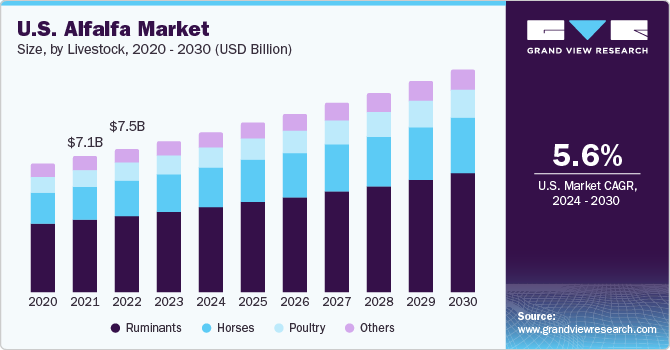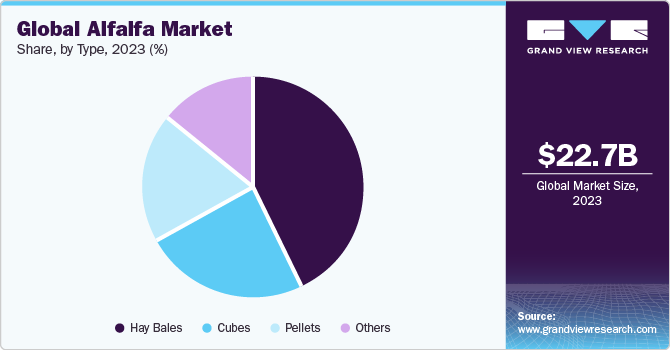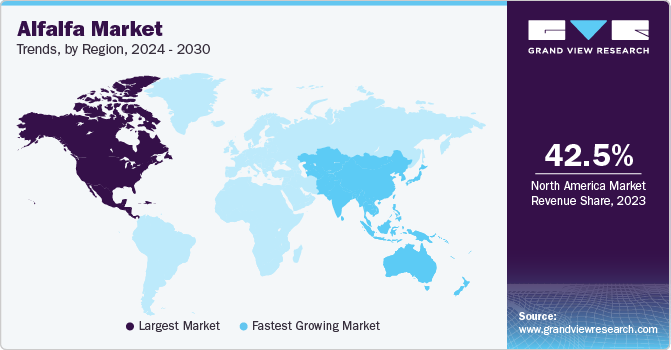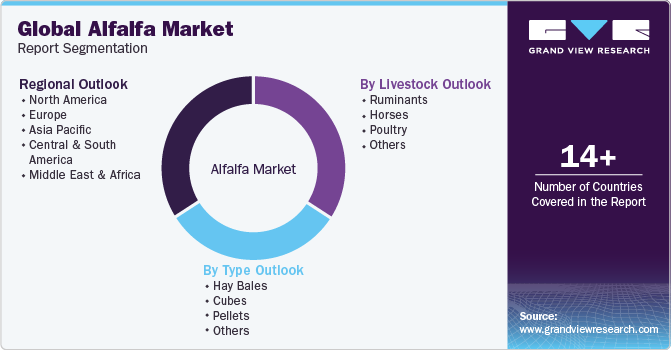- Home
- »
- Animal Feed and Feed Additives
- »
-
Alfalfa Market Size, Share & Growth Analysis Report, 2030GVR Report cover
![Alfalfa Market Size, Share & Trends Report]()
Alfalfa Market (2024 - 2030) Size, Share & Trends Analysis Report, By Type (Hay Bales, Cubes, Pellets), By Livestock (Ruminants, Horses, Poultry ), By Region, And Segment Forecasts
- Report ID: GVR-4-68040-166-9
- Number of Report Pages: 100
- Format: PDF
- Historical Range: 2018 - 2022
- Forecast Period: 2024 - 2030
- Industry: Specialty & Chemicals
- Report Summary
- Table of Contents
- Segmentation
- Methodology
- Download FREE Sample
-
Download Sample Report
Alfalfa Market Summary
The global alfalfa market was estimated at USD 22.69 billion in 2023 and is projected to reach USD 36.3 billion by 2030, growing at a CAGR of 6.0% from 2024 to 2030. The growth of the market is attributed to the rising demand for high-quality forage for livestock, as alfalfa is a nutritious feed source for animals, including dairy cows, horses, and cattle.
Key Market Trends & Insights
- North America dominated the market with a revenue share of 42.5% in 2023.
- Asia Pacific is anticipated to grow at a significant CAGR over the forecast period.
- Based on livestock, the ruminant livestock segment dominated the market with a revenue share of 53.3% in 2023.
- Based on type, the hay bales segment dominated the market with a revenue share of 42.5% in 2023.
Market Size & Forecast
- 2023 Market Size: USD 22.69 Billion
- 2030 Projected Market Size: USD 36.3 Billion
- CAGR (2024-2030): 6.0%
- North America: Largest market in 2023
Alfalfa is rich in protein, vitamins, and minerals, making it a high-quality forage source for dairy cows. It provides essential nutrients needed for milk production. The product is a good source of calcium, which is crucial for milk production and maintaining strong bones in dairy cows. It also contains phosphorus, which is important for overall cow health. The fiber in alfalfa can aid in maintaining healthy rumen function in cows, which is essential for digestion and nutrient absorption. Dairy cows typically find the product highly palatable, which can encourage them to consume adequate amounts of feed.
Alfalfa can be planted from seed or using transplants. Seeding is the more common method. The product can be harvested multiple times during the growing season. Timing of the first harvest is critical; it should occur when the plant is in the bud or early bloom stage for optimal nutrient content. After cutting, alfalfa can be dried in the field or processed into haylage or silage for preservation. Proper drying and storage are essential to maintain the quality of the forage.
Livestock Insight
The ruminant livestock dominated the market with a revenue share of 53.3% in 2023. This is attributed to the nutritional characteristics and compatibility of the product with the digestive systems of these animals. Alfalfa is known for its high protein content, which is essential for the growth, milk production, and overall health of ruminants. It helps meet the protein requirements of these animals. The product is a good source of calcium, necessary for bone health and milk production in dairy cows and phosphorus, important for overall animal well-being.
Horses segment was the second largest with a revenue share of 24.1% in 2023. This is attributed to its high protein, which can be beneficial for young, growing horses, pregnant or lactating mares, and horses with increased protein requirements, such as performance or working horses. It also provides energy through carbohydrates, which can support the energy requirements of horses, particularly those engaged in high-performance activities.
Other segments include poultry, goats, sheep, and pigs. The fiber in the product can aid in maintaining a healthy rumen, the first compartment of a goat's stomach, which is critical for efficient digestion. The product can be used as a feed supplement for chickens, providing essential nutrients, including vitamins and minerals. Chickens often use alfalfa leaves and stems as part of their dust baths, which help keep their feathers clean and control parasites.
Type Insight
The hay bales segment dominated the market with a revenue share of 42.5% in 2023.The growth is attributed to the fact that they provide a more natural and unprocessed form of forage, which can be beneficial for the psychological and physical well-being of certain livestock, such as horses and cows. The hay bales have a longer shelf life compared to other types, and it does not spoil if exposed to moisture unlike other types. This makes them convenient for storage and reduces the risk of spoilage.

Cubes was the second-largest type segment with a revenue share of 24.0% in 2023. This is attributed to its high compact and easy to handle nature, making them a convenient choice for storage and feeding. They are less bulky than hay bales and easier to transport. The cubes tend to have less dust and mold compared to loose hay, making them a cleaner and healthier option for animals and handlers.
Alfalfa powder is highly concentrated, making it a practical choice for supplementing the diets of livestock, particularly when specific nutrients are needed. Powder can be easily mixed with other feeds, supplements, or water to create customized dietary formulations. In addition, pellets have minimal waste during feeding, as they are less likely to be trampled or soiled by animals, resulting in better feed efficiency. Pellets are portioned into consistent sizes, allowing for precise portion control when feeding animals and managing their nutritional intake.
Regional Insights
North America dominated the market with a revenue share of 42.5% in 2023. This is attributed to the growing production and exports of the product from the U.S. to other countries across the globe. The high population of livestock in North America necessitates a constant supply of nutritious forage, which alfalfa provides.

Alfalfa is widely used in the U.S. equestrian industry, supporting the nutritional needs of horses across various disciplines, from racing to recreational riding. The dairy industry in the U.S. has been a major driver of the product demand. Dairy cows require high-quality forage, and product's nutritional value, especially its high protein content and calcium levels, making it an ideal choice to support milk production.
Asia Pacific is anticipated to grow at a significant CAGR over the forecast period. This is attributed to the increasing consumption of dairy products and meat in the region which is driving the demand for high-quality forage. Some countries in the Asia-Pacific region, like China and Japan, have limited arable land and water resources for forage production. They rely on imports of alfalfa and other forage crops to meet the dietary needs of their livestock.
Key Companies & Market Share Insights
Several manufacturers are adopting sustainable agricultural practices, including crop rotation, reduced chemical use, and water conservation, to minimize the environmental impact of alfalfa production. Some market players are investing in research and development to improve alfalfa cultivation techniques, including crop management, irrigation, pest control, and disease prevention. This can lead to higher yields and better quality forage.
Key players are adopting strategic initiatives such as new product development and merger & acquisition to gain competitive edge. For instance, in September 2023, DLF announced acquisition of the Corteva Agriscience’s alfalfa breeding program. This strategic move provides DLF with access to top-tier alfalfa genetics and a robust brand portfolio.
Key Alfalfa Companies:
- Alfalfa Monegros SL
- Anderson Hay & Grain Inc.
- Al Dahra ACX Global Inc.
- Standlee Premium Products, LLC
- Bailey Farms
- Cubeit Hay Company
- Green Prairie International
- Haykingdom Inc.
Alfalfa Market Report Scope
Report Attribute
Details
Market size value in 2024
USD 24.14 billion
Revenue forecast in 2030
USD 36.32 billion
Growth rate
CAGR of 6.0% from 2024 to 2030
Base year for estimation
2023
Historical data
2018 - 2022
Forecast period
2024 - 2030
Quantitative units
Revenue in USD million/billion, Volume in Kilotons and CAGR from 2024 to 2030
Report coverage
Revenue forecast, company ranking, competitive landscape, growth factors, and trends
Segments covered
Type, livestock, region
Regional Scope
North America; Europe; Asia Pacific; Central & South America; Middle East & Africa
Country Scope
U.S.; Canada; Mexico; Germany; U.K.; Italy; France; Spain; China; India; Japan; South Korea; Brazil, Argentina; Saudi Arabia; South Africa
Key companies profiled
Alfalfa Monegros SL; Anderson Hay & Grain Inc.; Al Dahra ACX Global Inc.;’ Standlee Premium Products, LLC; Bailey Farms; Cubeit Hay Company; Green Prairie International; Haykingdom Inc.
Customization scope
Free report customization (equivalent up to 8 analysts working days) with purchase. Addition or alteration to country, regional & segment scope. Pricing and purchase options
Avail customized purchase options to meet your exact research needs. Explore purchase options
Global Alfalfa Market Report Segmentation
This report forecasts revenue growth at global, regional, and country levels and provides an analysis on the latest industry trends in each of the sub-segments from 2018 to 2030. For this report, Grand View Research has segmented the Alfalfa market report based on type, livestock, and region:

-
By Type (Volume, Kilotons; Revenue, USD Million, 2018 - 2030)
-
Hay Bales
-
Cubes
-
Pellets
-
Others
-
-
By Livestock (Volume, Kilotons; Revenue, USD Million, 2018 - 2030)
-
Ruminants
-
Horses
-
Poultry
-
Others
-
-
Regional Outlook (Volume, Kilotons; Revenue, USD Million, 2018 - 2030)
-
North America
-
U.S.
-
Canada
-
Mexico
-
-
Europe
-
Germany
-
U.K.
-
France
-
Italy
-
Spain
-
-
Asia Pacific
-
China
-
India
-
Japan
-
South Korea
-
-
Central & South America
-
Brazil
-
Argentina
-
-
Middle East & Africa
-
Saudi Arabia
-
South Africa
-
-
Frequently Asked Questions About This Report
b. The global alfalfa market size was estimated at USD 22.69 billion in 2023 and is expected to reach USD 24.14 billion in 2024.
b. The global alfalfa market is expected to grow at a compound annual growth rate of 6.0% from 2024 to 2030 to reach USD 36.32 billion by 2030.
b. North America dominated the alfalfa market with a share of 42.0% in 2023. This is attributed to the growing production and exports of the product from the U.S. to other countries across the globe.
b. Some key players operating in the alfalfa market include Alfalfa Monegros SL, Anderson Hay & Grain Inc., Al Dahra ACX Global Inc., Standlee Premium Products, LLC, Bailey Farms, Cubeit Hay Company, Green Prairie International, Haykingdom Inc., and others
b. Key factors that are driving the market growth include the rising demand for high-quality forage for livestock, as alfalfa is a nutritious feed source for animals, including dairy cows, horses, and cattle.
Share this report with your colleague or friend.
Need a Tailored Report?
Customize this report to your needs — add regions, segments, or data points, with 20% free customization.

ISO 9001:2015 & 27001:2022 Certified
We are GDPR and CCPA compliant! Your transaction & personal information is safe and secure. For more details, please read our privacy policy.
Trusted market insights - try a free sample
See how our reports are structured and why industry leaders rely on Grand View Research. Get a free sample or ask us to tailor this report to your needs.










